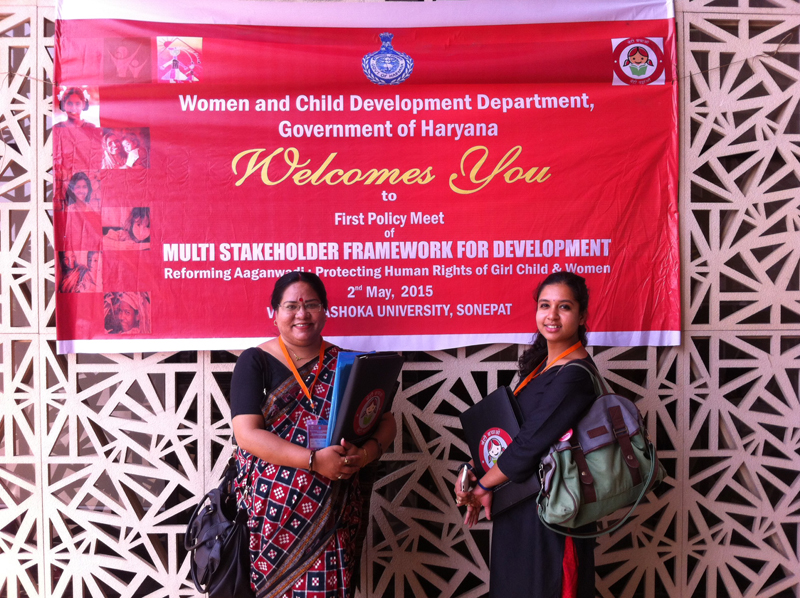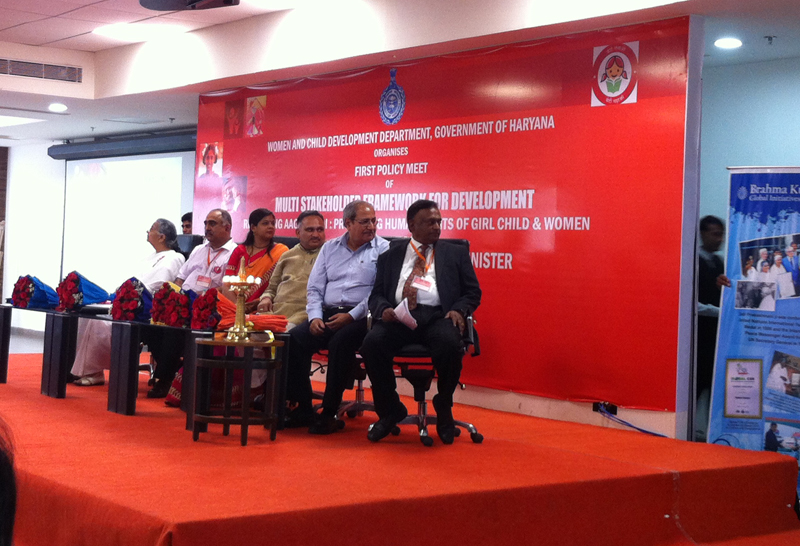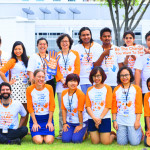The Women and Child Development Department of Haryana organized the first policy meet of multi-stakeholder framework for development on 2nd May 2015 at Ashoka University, Sonipat, Haryana. The focus of the meet was defined as,
Reforming Aaanganwadi: Protecting Human Rights of Girl Child and Women


Dr. Manasi Mishra, Mr. Vikram Sheoran and Ms. Arnika Singh represented Centre for Social Research at the programme. The meeting was called to share the plan of creating a network of 6000 aanganwadis with improved infrastructure and skilled employees with the stakeholders i.e. Civil Society Organisations, Doctors, Teachers, Schools, Universities, Government Representatives and the most important the Aanganwadi workers.
Sonipat, where the meeting was held, itself registers a dwindling Child Sex Ratio of 550/1000 in the age group of 0-6 years. Deepak Batra, coordinator of the policy met appealed the stakeholders to adopt the Aanganwadis and monitor them for better functioning. The next sessions were taken up by the experts present on the panel.
Professor Khanna while giving his presentation shared some stark facts reflecting the gruesome situation of gender biased sex selection in the state of Haryana. Mentioning that female foeticide in India has increased by 49.2%, he said that more about 12 million girls have been aborted over the last 3 decades.


The Child Sex Ratio in Haryana in 1901 was 867 girls per 1000 boys and in 2011, 877 girls per 1000 boys. Despite of all attempts to improve the situation, there are regions like Jhajjar where the ratio is 773/1000. We can easily sense the gravity of the scenario with these facts and analyze how deep rooted the issue is.
Professor Khanna also emphasized that gender biased sex selection is a social problem and it needs to be addressed continuously for a greater impact.
The issue of gender based sex selection is beyond class, education and society. 2011 census showed that there is a deficit of 3.72 crore in India.
Sharing the initiative of Asoka University graduates, Vice Chancellor Prof.R. H Dahiya told that the students are taking evening classes of the kids of the laborers working around the University. And now they plan to integrate this as a scheme where these kids can take admissions in the public/private schools and prepare themselves for the mainstream culture. The VC ensured that the quality of education of these kids would be match the standards of public/private run schools.
The panel discussion was concluded by Mrs. Kavita Jain, Hon’ble Cabinet Minister, WCD Deptt. Haryana who pledged to provide all the possible support for the empowerment of girl child. She also mentioned that the aanganwadi and the ICDS schemes are meant for the benefit of the under privileged kids and the govt. any recommendation that can make these policies effective.
The minister stayed throughout the programme and actively participated in all the discussions. She was accompanied by Mr. Rajiv Jain, State Vice President, Bhartiya Janata Party, who Post lunch, the participant groups were divided on the basis of their expertise and recommendations were collected to draft the programme policy for Aanganwadi workers.
Having done extensive research in the field of sex selective abortions, Dr. Manasi Maishra recommended the group of doctors to take out a day in a month and conduct health camps at the aanganwadi centres so that the community can be benefitted. She also participated in the ministerial board meeting and suggested measures like engaging the youth in the movement for a better outreach, regular checks on the aanganwadi centres, capacity building of the aanganwadi workers etc. to the minister. Her recommendations were appreciated by the members.
Looking forward to reading your blogs, you can mail us your entries at WriteWithUs@csrindia.org, or upload them at Write With Us.
Donation for Centre for Social Research to Join our effort in rehabilitating Domestic Violence
Discuss this article on Facebook




